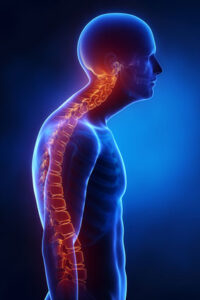Ayurveda, the traditional Indian system of medicine, offers holistic approaches to support the management of various health conditions, including kyphosis. While Ayurveda cannot reverse the structural changes of kyphosis, it can effectively alleviate associated symptoms and contribute to overall well-being. Here are some ways Ayurveda can be utilized in the treatment of kyphosis:
Herbal remedies:
In Ayurveda, specific herbs and formulations such as Ashwagandha, Guggulu, Shallaki, and Rasna may be prescribed to support spine health, reduce inflammation, and strengthen the musculoskeletal system. These herbs are believed to possess anti-inflammatory, analgesic, and rejuvenating properties.
Diet and nutrition:
Ayurveda places a strong emphasis on maintaining a balanced and nutritious diet to support overall health. A diet rich in fresh fruits, vegetables, whole grains, lean proteins, and healthy fats can provide essential nutrients to support bone health and reduce inflammation.
Yoga and exercise:
Incorporating specific yoga asanas (poses) and exercises into the routine can significantly contribute to the management of kyphosis. Practices focusing on spinal extension, such as Bhujangasana (Cobra Pose), Dhanurasana (Bow Pose), and Setu Bandhasana (Bridge Pose), may prove beneficial. It is advisable to consult with a qualified yoga instructor for personalized guidance.
Abhyanga (therapeutic oil massage):
Abhyanga, a traditional Ayurvedic oil massage, offers relief by alleviating muscle tension, improving circulation, and promoting relaxation. Targeted massage techniques applied to the back and spine area can effectively relieve discomfort associated with kyphosis.
